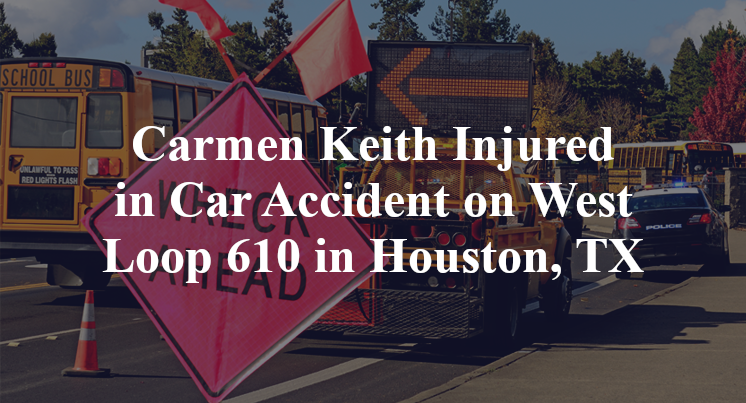Carmen Keith Injured in Car Accident on West Loop 610 in Houston, TX
Harris County, TX — July 31, 2024, Carmen Keith was injured due to a rear-end car accident at approximately 7:45 a.m. along West Loop South (I-610).
According to authorities, 43-year-old Carmen Keith was traveling in a northbound Ford Explorer in the far-left lane of West Loop South in the vicinity south of Westpark Drive when the accident took place.

Traffic conditions in the area at the time were apparently at a stop. Officials indicate that, for as yet unknown reasons, the Explorer was rear-ended by a northbound grey Toyota Camry. The Camry was then rear-ended by a black Toyota Camry.
Keith reportedly sustained serious injuries over the course of the accident. The drivers of the Camrys may have been hurt, as well, reports state. Additional details pertaining to this incident are not available at this point in time.
Commentary
Rear-end collisions in stop-and-go traffic may seem straightforward, but when serious injuries result and multiple vehicles are involved, there's more at stake than just identifying who hit whom. These types of crashes often involve missed opportunities to fully understand what triggered the sequence.
Did the authorities thoroughly investigate the crash?
With traffic reportedly at a stop, investigators should have reconstructed the crash with attention to speed, spacing, and reaction time. In chain-reaction collisions, it's critical to determine whether each driver had enough time and distance to respond. That means evaluating skid marks, impact angles, and vehicle positions—not just relying on driver statements. If those details weren’t documented at the scene, it becomes much harder to understand what actually caused the pile-up.
Has anyone looked into the possibility that a vehicle defect caused the crash?
When a driver fails to stop for traffic that’s already at a standstill, a brake failure or sensor malfunction could be involved. With both Camrys involved in successive impacts, it’s worth asking whether either had compromised braking systems or faulty collision detection features. Even a brief delay in response from a braking assist system could change the entire outcome. Without mechanical inspections, those issues might never be identified.
Has all the electronic data relating to the crash been collected?
Modern vehicles—especially late-model Toyotas and Fords—store critical pre-crash data. Speed, throttle use, brake pressure, and even seatbelt status can all help explain how the crash unfolded. If those data logs haven’t been retrieved, it leaves too many unanswered questions about whether driver behavior, distraction, or mechanical failure played a role. Any dash cam footage or traffic camera views nearby could also help verify what really happened and in what order.
Even in a seemingly routine rear-end crash, the seriousness of the injuries and the involvement of multiple vehicles mean that no detail should be taken for granted. A full understanding depends on asking the right questions before the evidence fades.
Takeaways:
- Chain-reaction crashes need detailed reconstruction to establish cause and timing.
- Brake or sensor failures could contribute and should be ruled out with inspection.
- Electronic data and camera footage may clarify vehicle behavior before impact.

*We appreciate your feedback and welcome anyone to comment on our blog entries, however all visitor blog comments must be approved by the site moderator prior to showing live on the site. By submitting a blog comment you acknowledge that your post may appear live on the site for any visitors to see, pending moderator approval. The operators of this site are not responsible for the accuracy or content of the comments made by site visitors. By submitting a comment, blog post, or email to this site you acknowledge that you may receive a response with regard to your questions or concerns. If you contact Grossman Law Offices using this online form, your message will not create an attorney-client relationship and will not necessarily be treated as privileged or confidential! You should not send sensitive or confidential information via the Internet. Since the Internet is not necessarily a secure environment, it is not possible to ensure that your message sent via the Internet might be kept secure and confidential. When you fill out a contact or comment form, send us an email directly, initiate a chat session or call us, you acknowledge we may use your contact information to communicate with you in the future for marketing purposes, but such marketing will always be done in an ethical way.